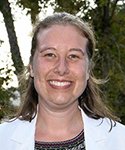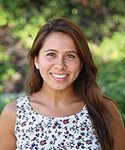Editor’s Note: The opinions expressed in this article are those of the author and do not necessarily reflect the opinions, positions, or the polices of the AAMC or its members.

Stephanie Navarro is an MD/PhD student at the Keck School of Medicine of USC and is currently in her first year of PhD studies in Epidemiology. Stephanie hopes to one day contribute to ensuring quality health care for all patients as a primary care physician and health services researcher.

Diana Torres Pinzon, MD-MPH student, was born and raised in Bogota, Colombia, and moved to the United States when she was thirteen years old. She went to undergraduate at Rutgers University and decided to attend Keck School of Medicine after participating in the school's Bridging the Gaps program for minority premedical students. Diana has decided to go into internal medicine with the goal to work in underserved communities and apply her background in public health to address health disparities.
It is widely believed that medical school should be completed within four years and any deviations from that is unusual, yet a full 20% of our class will need more time to graduate. The reasons are many. Some students take time to complete a PhD, or a research year, or a master’s degree in public health, public policy, or business. Other students take time off for personal reasons such as medical illness, mental illness, or family issues. Our student interest group aims to validate, support, and encourage students who are either considering an alternate route during medical school or are already on that path.
Below are four student perspectives on the creation of the “Detour” SIG.
Stephanie Navarro, MD/PhD student:
“As an MD-PhD student, I entered medical school knowing that I was on a different trajectory than most of my peers. Even though I had this path in mind since applying to medical school, I still had trouble transitioning to graduate school while my peers were progressing to their third year of medical school. I couldn’t help feeling as if I wasn’t progressing along with my peers, and I found myself having to confront these skewed feelings of inadequacy and alienation. Through Detour, I hope to be a leader and mentor in both supporting other students who are taking nontraditional paths through medical school and facing similar experiences, as well as normalizing the idea that medical school does not need to be completed in four consecutive years.”
Katharine Blair Stiers, third year medical student who took a research year:
“My mom was diagnosed with metastatic breast cancer in 2014, and I started medical school in 2016. I had tremendous guilt about being away from my family, which took a toll on my physical and emotional health. Ultimately, I decided to take a Dean's Research Year after my second year, which is allowing me to complete a research project close to my family. Although I knew this was the right decision for me, I had considerable anxiety because it felt scary to not graduate in four years, and to join another class. My stress would have been lessened significantly if I had someone with a similar experience to talk to about this decision. Detour offers an opportunity to validate students and provide a support system for them. I think it's important to honor yourself and listen to what your body needs. My mom passed away while I was home with her, and I am so grateful to have another year of memories to hold onto. I hope to help students not feel guilty about prioritizing their family and their own mental health. Because in the end, none of this is worth it if we don't take care of ourselves.”
Diana Torres Pinzon, MD-MPH student:
“It can be isolating when you are no longer part of your medical school class, and it can also be challenging when you need to adjust back to the medical school curriculum. One of the values of having this student organization is that it creates a community for those students taking nontraditional paths through medical school, which allows us to keep in touch with our peers and support each other. It also serves to raise awareness among the student body about different paths they may take, and ways faculty or school administrators can support us as we transition back to medical school, apply to residency, or even managing the logistics and process of deciding to take extra time.”
Andrea Bañuelos Mota, MD-MPH student:
“Detour aims to personalize the face of resilience and creativity. By increasing the visibility of those who take alternate routes, we hope that our peers can identify with us and expand their understanding of what a medical school education may be like. While our student interest group is young, we have big dreams for its potential. We believe that inclusivity of all sorts, including that of the nontraditional student, is important to the well-being of all. We hope our efforts contribute to that.”